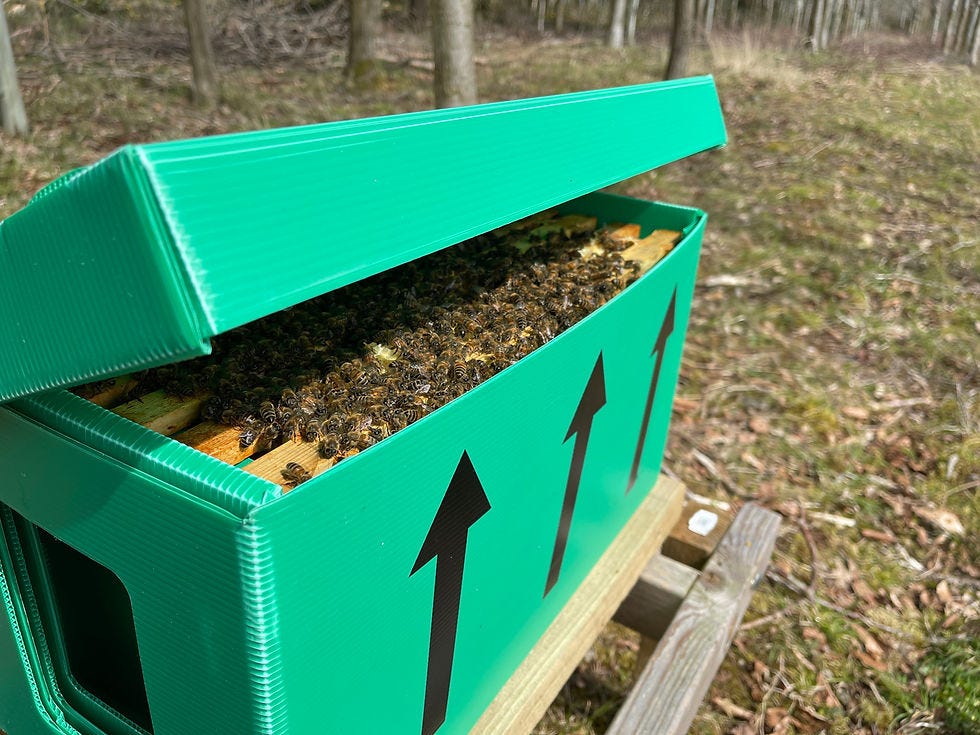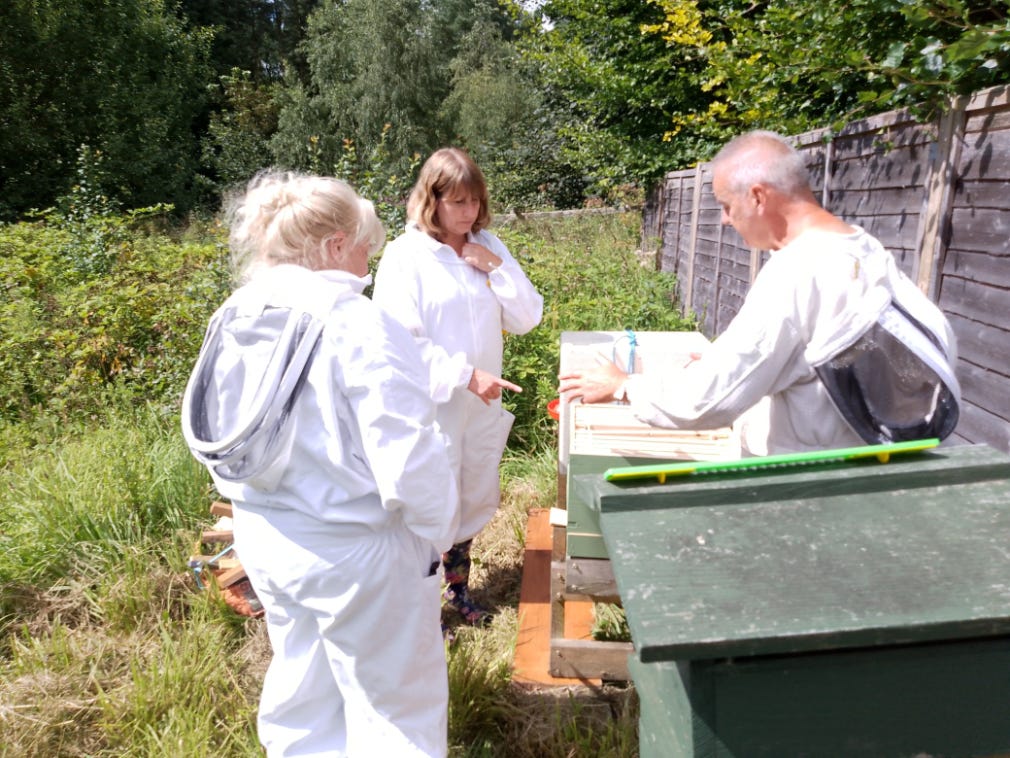The bees move in
As I take my leave
The human tenants of my plot, Yvonne and Sharron, had already moved in (see Plot Developments 20) and put their hive in place.
The bee tenants arrived a week later to populate that hive.
They were delivered as a nucleus which the ladies had bought. Often abbreviated to “nuc” in beespeak, a nucleus is the foundation for a colony. It includes a laying queen, a small population of worker bees and some brood, pollen and honey, all transported on a few frames in a nuc box, which is like a hive only smaller.
(Nuc box with bees - and helpful directions for opening)
This travelling accommodation for bees always reminds me of Churchill’s phrase - “transported in a sealed railway carriage like a plague bacillus” - to describe Lenin’s journey across Europe in 1917 when the Germans gave him a free pass to Petrograd’s Finland Station to foment the October revolution in Russia. It’s comparable only in the sense that the innocent recipients, eagerly awaiting the arrival, may have little idea how much trouble is coming their way.
The transaction between vendors and customers over a nuc is a bit of a business. Beekeepers cultivate nucs from their own colonies, usually by separating them from a parent colony which is about to swarm. A nuc with an active, laying young queen costs almost nothing to produce but it sells for about £120 so it makes a handy stream of income for experienced beekeepers. Many of the customers are beginners like Yvonne and Sharron.
Their nuc had been raised by an experienced member of our local beekeeping club and it was delivered by the secretary, Ian, who is a real expert.
He was running a little late for the delivery. The ladies were early. They couldn’t wait.
Their new beesuits were as spotlessly white as the surplices in a cathedral choir. My own was shamefully grubby. Not having put on my wonderful Oz Armour suit since February, I couldn’t remember the complicated procedure for attaching the zips for the hood and veil. Having fiddled and failed for about 20 minutes, I went to the shed and pulled out the old suit I bought in 2017, when I started beekeeping. It had been mouldering at the bottom of an old IKEA bag and looked like something the Ghostbusters might have worn for one of their drenchings in ectoplasm. When Ian arrived, he looked me over with barely concealed astonishment.
Ian spends so much of his life around bees that he didn’t even bother to light a smoker or put on gloves to handle the frames. The slow, gentle movements of an expert always remind me of tai chi and they seem to convey to the insects a sense of being securely in good hands. While he showed Yvonne and Sharron how to place the frames in the middle of their new hive in order to encourage the growth of a cluster, I stood off at a distance taking photographs.
(l-r: Sharron; Yvonne; Ian)
The moment of highest excitement came when the ladies spotted their queen. It helped that she was marked with a blue spot on her thorax (blue being the colour for this year’s queen) but, even so, it was exceptionally good going on Yvonne’s part to pick her out on the side of a frame. As Ian explained, it’s possible for even an experienced beekeeper to go a whole season without actually seeing the queen. During those long lacunae, the beekeeper depends on picking up indications that an active queen is present and at work – such as eggs, brood and workers coming in bearing pollen – rather than laying eyes on the mother herself.
As he filled the hive with frames, Ian came to the point where he needed a dummy board to put in at the end and fill the space. He asked if the ladies had brought one. They hadn’t. I said I’d go and get one from my shed.
I rooted around on the shelves in the half-light in the shed and pulled a board out of a brood box. It was a bit warped and grubby from having been in that box when I was extracting wax with a steamer earlier this year but it didn’t occur to me that it might be deemed unacceptable.
Ian, however, looked upon it as if was carrying a specimen of plague bacillus. “That won’t do at all!” he said. I felt like an army recruit with dirty boots in front of the parade sergeant.
This dressing-down helped to confirm my plan to leave the beekeeping on this plot to my keen new tenants. It also prompts me to take my leave – at least temporarily – of this space and my readers.
Apart from a growing loss of enthusiasm for beekeeping and loss of physical strength, production of this column has been hampered this year by a succession of medical trials, including spells in hospital.
At the same time, a member of my family is now needing increasingly constant care which only I am in a position to provide. This responsibility is going to leave little time for writing.
It feels like the right moment to pack up. After writing about bees and beekeeping for almost seven years – and having produced about a quarter of a million words on the topic - I am left with not much to add. I now feel that I have exhausted the subject just as much as it has exhausted me. Those ladies could not have arrived at a better moment. Perhaps I might take a swarm or two from them next year to populate my Warre′ and top bar hives and start again.
In the meantime, however, silence falls upon this space.
I want to thank all my readers and supporters and the many friends who have given me encouragement.
And money.
Subscribers should now stop their payment, please. If you are due a refund, please contact me directly.
Toodlepip
N




I've really enjoyed your insights, as I'm sure your other followers have, but life events can derail even the best of projects and put more urgent tasks. I hope everything goes well with your new duties and your health etc. If you get time it would be great if you get a chance to write something from time to time.
I will miss your wisdom… we need to go for a beer more often.